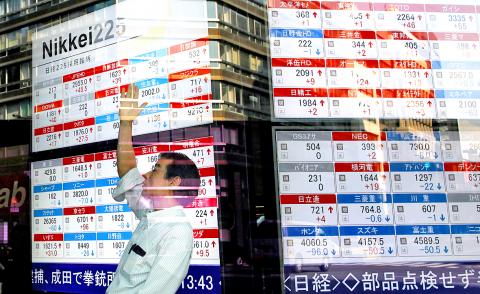Japanese stocks yesterday closed at a more than 18-year high, surpassing the height of the global information-technology bubble, boosted by confidence that Greece will reach a last-minute debt reform deal with its creditors this week.
The benchmark Nikkei 225 index at the Tokyo Stock Exchange gained 0.28 percent, or 58.61 points, to 20,868.03, its highest close since December 1996.
It rose to above the Japanese peak of the so-called dotcom bubble in April 2000 when the index hit 20,833. The TOPIX of all first-section issues was up 0.21 percent, or 3.49 points, at 1,679.89.

Photo: AP
“Finally,” Masaaki Yamaguchi, an equity market strategist at Nomura Holdings, told Bloomberg News.
With the milestone out of the way, “we’ll see an even higher tolerance for risk,” he said.
The Nikkei has climbed nearly 20 percent since the start of this year, following a rise of more than 7 percent last year and a 57 percent surge in 2013.
“The Japanese economy is improving and corporate earnings are doing well,” SMBC Nikko Securities Inc manager Hiroichi Nishi told Bloomberg News. “As monetary policy in the United States moves towards normalization, we’ll have moderate rate hikes.”
“We’ll continue to have to watch the situation in Greece carefully, but within the wait-and-see mood there’s increasing hope that they’ll come to an agreement,” he said.
Investors were betting on a breakthrough to end a five-month stalemate between Greece and its creditors, which would unlock billions of euros in funding Athens needs to repay a debt payment due on Tuesday. Failure to do so would see it default and possibly crash out of the eurozone, and even the EU.
Eurozone finance ministers were scheduled to meet yesterday to try to secure an agreement before a full EU summit today.
Elsewhere in Asia, Shanghai piled on 2.48 percent, or 113.66 points, to 4,690.15 — extending Tuesday’s 2.19 percent gain — after plunging more than 13 percent last week.
Analysts said the market is benefiting from the release of cash that had been tied up for a recent batch of initial public offerings.
Hong Kong advanced 0.26 percent, or 71.51 points, to 27,404.97.
Sydney was flat, adding 2.5 points to close at 5,686.8, and Seoul was 0.21 percent, or 4.33 points, higher at 2,085.53. Taipei was flat at 9,397.31, Wellington ended marginally higher at 5,775.48, while Manila closed 1.21 percent higher at 7,643.33.

Nvidia Corp chief executive officer Jensen Huang (黃仁勳) on Monday introduced the company’s latest supercomputer platform, featuring six new chips made by Taiwan Semiconductor Manufacturing Co (TSMC, 台積電), saying that it is now “in full production.” “If Vera Rubin is going to be in time for this year, it must be in production by now, and so, today I can tell you that Vera Rubin is in full production,” Huang said during his keynote speech at CES in Las Vegas. The rollout of six concurrent chips for Vera Rubin — the company’s next-generation artificial intelligence (AI) computing platform — marks a strategic

REVENUE PERFORMANCE: Cloud and network products, and electronic components saw strong increases, while smart consumer electronics and computing products fell Hon Hai Precision Industry Co (鴻海精密) yesterday posted 26.51 percent quarterly growth in revenue for last quarter to NT$2.6 trillion (US$82.44 billion), the strongest on record for the period and above expectations, but the company forecast a slight revenue dip this quarter due to seasonal factors. On an annual basis, revenue last quarter grew 22.07 percent, the company said. Analysts on average estimated about NT$2.4 trillion increase. Hon Hai, which assembles servers for Nvidia Corp and iPhones for Apple Inc, is expanding its capacity in the US, adding artificial intelligence (AI) server production in Wisconsin and Texas, where it operates established campuses. This

US President Donald Trump on Friday blocked US photonics firm HieFo Corp’s US$3 million acquisition of assets in New Jersey-based aerospace and defense specialist Emcore Corp, citing national security and China-related concerns. In an order released by the White House, Trump said HieFo was “controlled by a citizen of the People’s Republic of China” and that its 2024 acquisition of Emcore’s businesses led the US president to believe that it might “take action that threatens to impair the national security of the United States.” The order did not name the person or detail Trump’s concerns. “The Transaction is hereby prohibited,”

Garment maker Makalot Industrial Co (聚陽) yesterday reported lower-than-expected fourth-quarter revenue of NT$7.93 billion (US$251.44 million), down 9.48 percent from NT$8.76 billion a year earlier. On a quarterly basis, revenue fell 10.83 percent from NT$8.89 billion, company data showed. The figure was also lower than market expectations of NT$8.05 billion, according to data compiled by Yuanta Securities Investment and Consulting Co (元大投顧), which had projected NT$8.22 billion. Makalot’s revenue this quarter would likely increase by a mid-teens percentage as the industry is entering its high season, Yuanta said. Overall, Makalot’s revenue last year totaled NT$34.43 billion, down 3.08 percent from its record NT$35.52